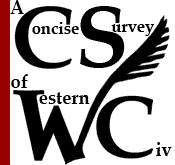Primary Sources for Chapter 1
History’s Story
Study Guide | Extras | Links
Research Plan: A suggested process for writing research papers.
Content Question: How does this plan compare to the outline of the Historical Method?
Analysis Question: How are the writing process and research interconnected?
Evaluative Questions: How would following the various steps promote a quality finished product?
What is History?: Short quotes from famous people and historians trying to describe the art and practice of history.
Content Question: Which quotes match your own view?
Analysis Question: Which quotes seem mutually contradictory?
Evaluative Questions: Given the diversity of descriptions of history, how should we define it?
First use of "lies" and "falsehoods" and "not facts" replaced by the term "alternative facts."
Other Sources:
Other short quotes describing history; and and yet a few more.
Alun Munslow, "What History is": an essay discussing the practice of history after the "linguistic turn" of postmodernism.
"Why do People Fall for Fake News?": an essay by two psychologists who suggest it is because people are mentally lazy.
History Myths Debunked: blog which does what it says.
Media Bias/Fact Check: website that provides resources to help get at the truth in modern media.
Media Bias Chart: evaluates where different media sources are biased on the political spectrum.
"The Science of Why We Don’t Believe Science": article about how emotions and values shape people's acceptance of facts.
How to Spot Fake News: various approaches to avoiding lies and misinformation. Poster version of How to Spot Fake News.
Argument about what to teach concerning police violence.
Primary Source Project Links
1. Thucydides versus von Ranke about the Aim of History
1alternate. Voltaire versus Macaulay



